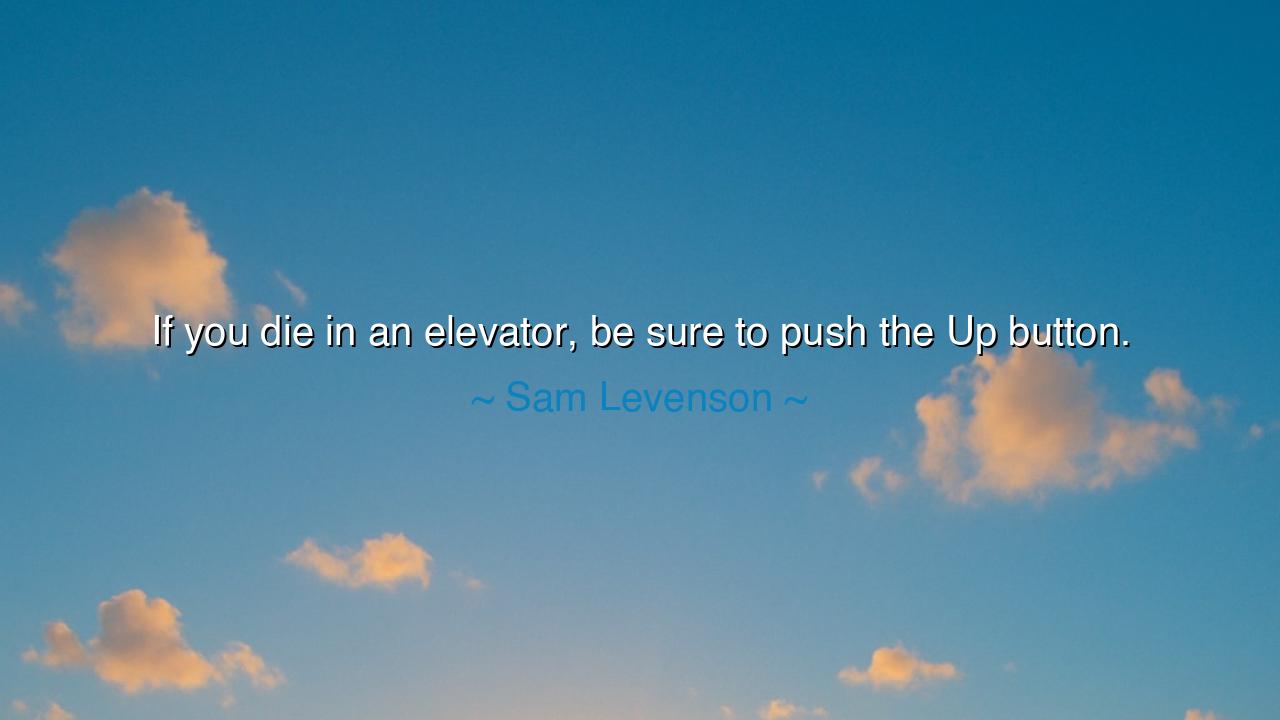
If you die in an elevator, be sure to push the Up button.






The humorist Sam Levenson, with his trademark wit and hidden depth, once said: “If you die in an elevator, be sure to push the Up button.” On the surface, the line sparkles with irony—a joke about facing death with practicality or perhaps absurd optimism. Yet beneath its levity lies a profound message, one that the ancients themselves might have uttered in parable form: even in the face of despair, choose the direction of hope. Levenson’s words are not merely humorous; they are a quiet hymn to resilience, to faith, and to the enduring human instinct to seek light even as the darkness closes in.
To push the Up button is to affirm life’s ultimate orientation toward the good. It is a metaphor that transcends machinery and circumstance—it speaks to the spirit’s upward will, even when the body fails. In every struggle, in every fall, there exists a moment when one can either surrender to despair or reach, however faintly, toward transcendence. The ancients would have called this “raising the heart,” or “turning the soul toward heaven.” Levenson, in his modern tongue, captures the same eternal wisdom: when you cannot control what happens, you can still control the direction of your spirit.
This wisdom was lived, not merely spoken, by those who endured the darkest hours of history. Think of Viktor Frankl, the psychiatrist and Holocaust survivor who, imprisoned in the concentration camps, refused to let his spirit be destroyed. Surrounded by death, starvation, and cruelty, he chose each day to believe in something higher—meaning, dignity, and the possibility of goodness even in suffering. He later wrote, “Everything can be taken from a man but one thing: the last of the human freedoms—to choose one’s attitude in any given set of circumstances.” Frankl, though surrounded by death, continually “pushed the Up button.” He rose in spirit even when all else fell.
So too does Levenson’s quote teach us to laugh at despair without denying it. His humor is not frivolous—it is defiant wisdom, the kind that faces tragedy and still smiles. The elevator becomes a symbol of life itself—an enclosed, uncertain passage that moves between levels, where we are never fully in control of its motion. Death, then, is but another stop on the journey. Yet Levenson urges us: even there, make your final gesture one of hope, not fear. Even when you can no longer move upward physically, choose upwardness in spirit.
There is, too, a deeper moral in his jest: maintain your sense of humor. The ancients revered laughter as a divine gift, a sign that the soul still breathes beneath the weight of sorrow. To laugh in the face of the inevitable is not denial—it is mastery. It is the mark of those who have seen the fragility of life and still find it beautiful. The wise understand that humor is not a retreat from pain, but a way to reclaim power from it. For laughter, like faith, lifts the soul.
Let us then consider what it means to “push the Up button” in our daily lives. It means choosing gratitude when bitterness tempts us, courage when fear surrounds us, kindness when cruelty abounds. It means that when life’s elevator halts between floors—when progress stalls and darkness hums around us—we refuse to panic. Instead, we breathe, smile, and press “Up,” trusting that even unseen forces will carry us toward light. This is not blind optimism; it is spiritual discipline—the deliberate act of turning one’s heart toward what is good.
And so, my child, remember this teaching: death may find us, but despair need not. If the day comes when all seems lost, still reach upward—whether through prayer, laughter, or love. The universe, it seems, favors those who rise in spirit, even when gravity pulls hard. In every ending, there is the whisper of ascent. To push the Up button is to declare, with grace and humor, “I will not go down without reaching for the light.”
Thus, Sam Levenson’s playful wisdom endures like a smile carved in eternity: that no matter where the journey takes you—through joy or sorrow, life or death—always rise. For the soul that remembers how to lift itself, even in its final breath, has already conquered the elevator’s descent.






AAdministratorAdministrator
Welcome, honored guests. Please leave a comment, we will respond soon